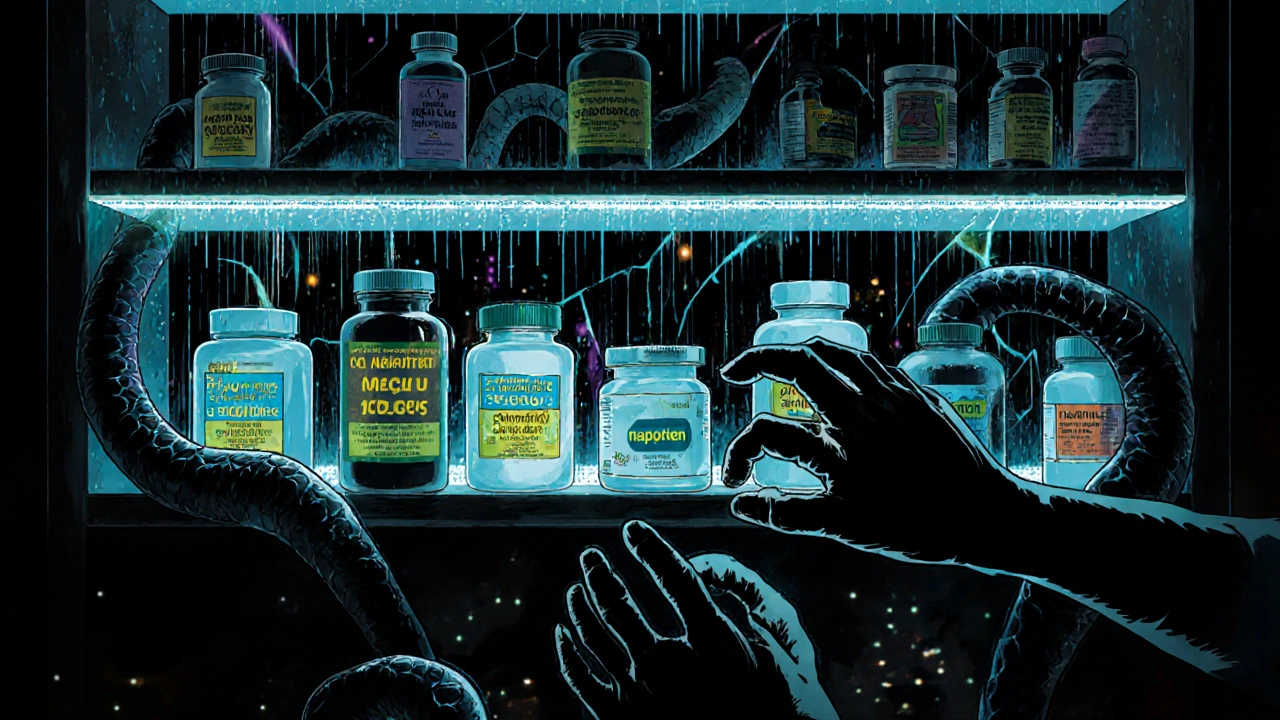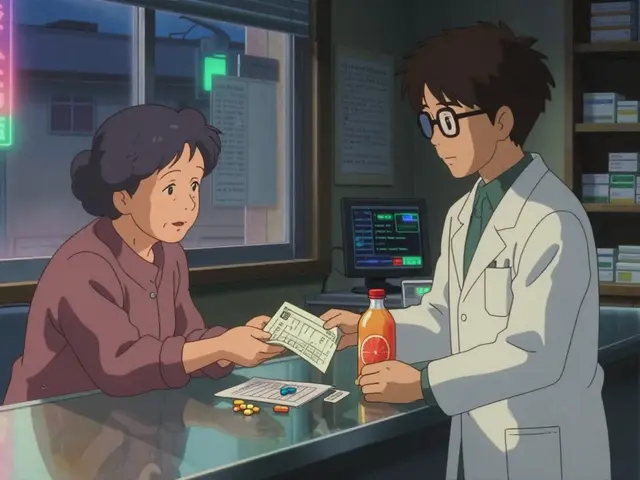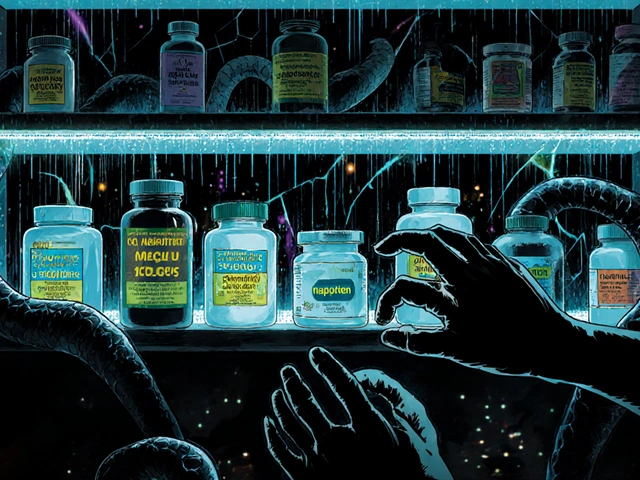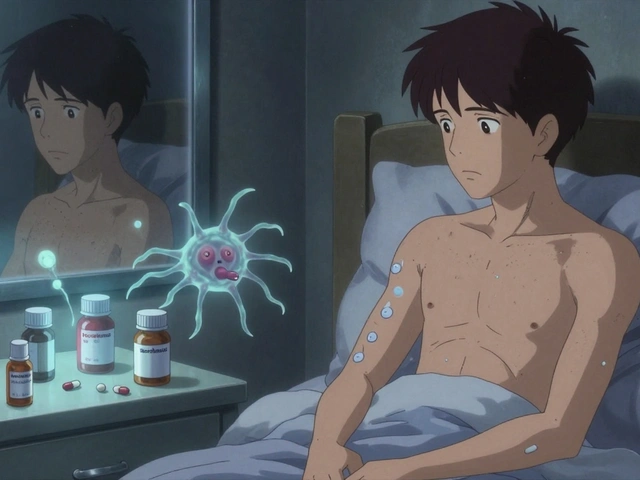OTC Medication Safety Checker
Check for Dangerous Interactions
Enter medications you're currently taking to see potential risks from hidden ingredients or dangerous combinations.
WARNING: DANGEROUS INTERACTION DETECTED
Do not take these medications together without medical supervision.
Possible risks:
SAFE INTERACTION
No dangerous interactions detected based on current information.
Remember: Always check the FDA Health Fraud Database and consult your pharmacist using the 5-5-5 rule.
Important: This tool identifies known dangerous combinations from the article. It does NOT replace medical advice. If you're taking any prescription medications, consult your healthcare provider before taking new supplements or OTC products. Always use the 5-5-5 rule before purchasing any supplement.
Every year, millions of people reach for over-the-counter (OTC) meds without a second thought. A headache? Grab some ibuprofen. Trouble sleeping? Diphenhydramine is right there on the shelf. Want to lose a few pounds or boost your performance? There’s a “natural” pill for that too. But what if those pills aren’t what they claim to be? What if they contain powerful drugs you’ve never heard of-drugs that could send you to the hospital, or worse?
What’s Really in Your Medicine Cabinet?
You might assume that if it’s sold in a pharmacy or online store, it’s safe. That’s a dangerous assumption. The truth is, the OTC supplement industry operates with almost no real oversight. Under the Dietary Supplement Health and Education Act of 1994, companies don’t have to prove their products are safe before selling them. The burden falls on the FDA to prove they’re dangerous after they’re already on shelves-and that’s a slow, underfunded process. A 2022 study by University of Connecticut researcher Dr. Pieter Cohen found over 1,000 dietary supplements between 2007 and 2021 that contained hidden pharmaceutical ingredients. These weren’t mistakes. These were deliberate additions. Manufacturers sneak in prescription drugs like sildenafil (the active ingredient in Viagra) or sibutramine (a banned weight-loss drug) because they work fast-and consumers notice the results. But they don’t know they’re taking a drug at all. Hidden ingredients are especially common in products marketed for sexual enhancement and weight loss. One in every 1.2 weight loss supplements tested contained sibutramine, a compound that raises blood pressure and increases heart attack risk by 16%. Sexual enhancement pills? Nearly 87% of those labeled “all-natural” contained sildenafil or tadalafil-both prescription-only drugs that can cause dangerous drops in blood pressure, especially when mixed with heart medications.The Real Danger: Drug Interactions You Never Saw Coming
The biggest risk isn’t just the hidden drug itself-it’s what happens when you mix it with something else. Take a 68-year-old man taking blood pressure meds and a “natural” joint pain supplement that secretly contains naproxen (an NSAID) and hidden corticosteroids. He doesn’t know he’s doubling his NSAID dose. He doesn’t know he’s adding steroids to his system. Within weeks, he’s in the ER with a stomach ulcer, kidney damage, and a spike in blood sugar. NSAIDs like ibuprofen and naproxen are common in OTC pain relievers. But they’re also hidden in arthritis creams, gels, and “anti-inflammatory” supplements. The American College of Gastroenterology says NSAID-related complications cause 100,000 hospitalizations and 16,500 deaths in the U.S. every year. Now imagine those numbers with hidden ingredients mixed in. The real toll is likely much higher because most cases go unreported. Even seemingly harmless OTC drugs can turn deadly. Diphenhydramine (Benadryl) is sold as a sleep aid. But in high doses, it causes hallucinations, seizures, and irregular heart rhythms. In 2020-2021, social media challenges encouraged teens to overdose on Benadryl for a “high.” At least three died. Hospitals reported cases of extreme confusion, rapid heartbeat, and cardiac arrest-all from a drug most people think is safe.Who’s Most at Risk?
Some groups are far more vulnerable. Older adults are the most at risk. On average, they take nearly five prescription medications and several supplements. Each one is a potential interaction waiting to happen. A supplement with hidden sildenafil can crash blood pressure when combined with nitroglycerin or alpha-blockers. A weight-loss pill with sibutramine can spike heart rate in someone on antidepressants. Teens and young adults are another high-risk group. Social media fuels dangerous trends-like the “Benadryl challenge” or “OTC party pills.” Many don’t realize they’re ingesting powerful drugs. Even a single pill can cause organ damage or death. People with chronic conditions are also in danger. Diabetics who take supplements for weight loss or energy might unknowingly ingest hidden steroids or stimulants that send blood sugar levels soaring. Those with liver disease can suffer acute toxicity from hidden phenolphthalein-a banned laxative linked to cancer.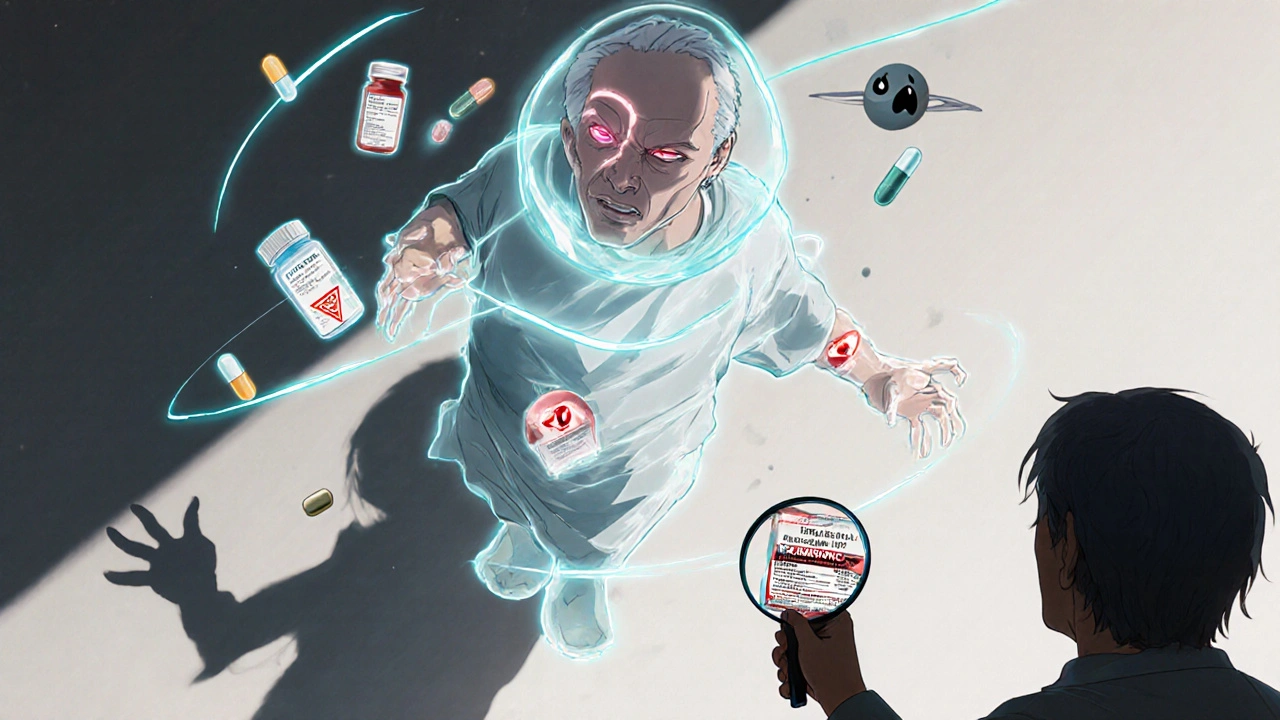
How to Protect Yourself
You can’t avoid all OTC products-but you can avoid the dangerous ones. Here’s how:- Check the FDA’s Health Fraud Product Database before buying any supplement. Search by product name or ingredient. If it’s listed, don’t buy it. And remember: just because it’s not listed doesn’t mean it’s safe.
- Look for trusted third-party seals like USP, NSF International, or ConsumerLab.com. These organizations test products for what’s on the label-and what’s not. They don’t guarantee safety, but they catch the worst offenders.
- Use the 5-5-5 rule before buying any OTC product: Spend 5 minutes Googling the product, 5 minutes checking the FDA database, and 5 minutes talking to your pharmacist. Pharmacists see these cases every day. They’ll tell you what to avoid.
- Keep a full medication list-including every supplement, herb, and vitamin-and bring it to every doctor’s visit. A 2021 JAMA study found 63% of adverse events from supplements happened because patients didn’t tell their doctors they were taking them.
- Avoid anything that sounds too good to be true. “Lose 20 pounds in 2 weeks.” “All-natural Viagra.” “Instant joint relief.” These are red flags. Legitimate products don’t make miracle claims.
What About “Natural” and “Herbal”?
The word “natural” doesn’t mean safe. In fact, it’s often a cover for something dangerous. Many herbal supplements are just containers for hidden drugs. A product called “Artri” or “Ortiga” might sound like a plant extract-but FDA investigations found them packed with prescription painkillers and steroids. Even common herbs can be risky. St. John’s Wort interferes with over 50 medications, including antidepressants, birth control, and blood thinners. Kava, once popular for anxiety, was linked to severe liver damage and banned in several countries.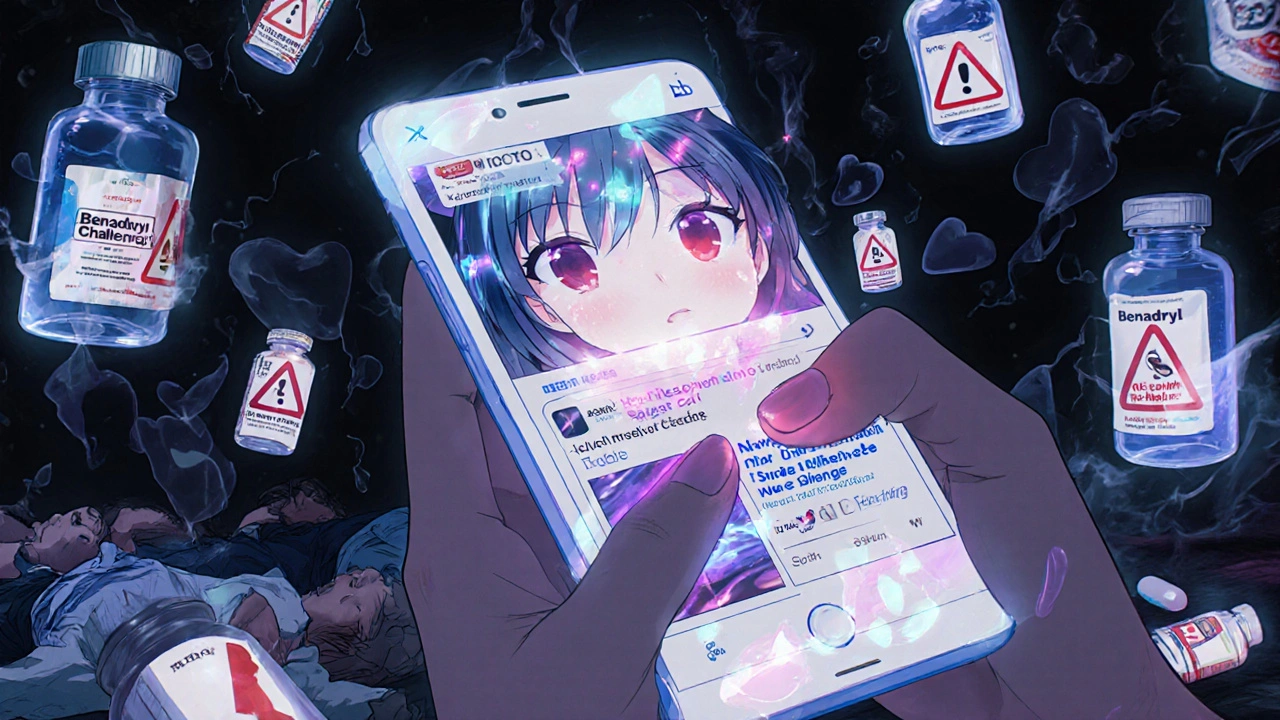
Why Is This Still Happening?
The system is broken. The FDA has only 17 full-time staff members dedicated to monitoring all dietary supplements in the U.S. Meanwhile, the industry generates over $55 billion a year. E-commerce makes it easier than ever to sell unsafe products directly to consumers. A product can be listed on Amazon, shipped from overseas, and sold to thousands before regulators even know it exists. The FDA’s average time to remove a dangerous product from the market? 14 months. By then, thousands may have already taken it. And only 0.3% of adverse events are ever reported. That means for every one case that makes it to the FDA, hundreds go unnoticed. Congress is trying to fix this. The 2023 OTC Medication Safety Act proposes mandatory reporting and stronger penalties. But until then, the responsibility falls on you.What to Do If You’ve Been Affected
If you’ve taken a supplement and experienced:- Sudden high blood pressure
- Unexplained rapid heartbeat
- Severe stomach pain or bleeding
- Difficulty breathing or chest pain
- Prolonged erection (over 4 hours)
- Confusion, hallucinations, or seizures
Bottom Line: Trust, But Verify
OTC medications and supplements aren’t inherently dangerous. But the lack of oversight means you can’t assume safety. The same pill that helps one person might harm another-especially if it contains hidden drugs. The best protection isn’t avoiding OTC meds altogether. It’s knowing what’s in them, understanding the risks, and asking questions before you take anything. You don’t need to be a scientist to stay safe. You just need to be curious. Check the label. Search the database. Talk to your pharmacist. And never assume “natural” means harmless.Are over-the-counter supplements regulated like prescription drugs?
No. Unlike prescription drugs, supplements don’t need FDA approval before being sold. Manufacturers are responsible for proving safety themselves, and the FDA only steps in after harm is reported. This creates a dangerous gap where contaminated or mislabeled products stay on shelves for months or even years.
Can OTC pain relievers like ibuprofen be dangerous?
Yes. Even regular OTC NSAIDs like ibuprofen and naproxen can cause stomach ulcers, kidney damage, heart attacks, and strokes-especially with long-term use or when combined with other medications. When hidden NSAIDs are added to supplements, the risk multiplies. Many people don’t realize they’re taking multiple doses at once.
How do I know if a supplement contains hidden drugs?
You can’t tell by looking. Hidden drugs aren’t listed on labels. The only reliable way is to check the FDA’s Health Fraud Product Database or buy products with third-party verification seals (USP, NSF, ConsumerLab). If it’s sold online with exaggerated claims-“miracle weight loss,” “natural Viagra”-assume it’s contaminated until proven otherwise.
Why do supplement companies add hidden drugs?
Because they work-and consumers notice. A weight-loss pill with sibutramine causes quick appetite suppression. A sexual enhancement product with sildenafil delivers immediate results. These drugs are cheap to produce and highly effective. Companies add them to make their products sell better, even if it puts users at risk.
What should I do if I think a supplement made me sick?
Stop taking it immediately. See a doctor and bring the product bottle. Report the incident to the FDA through MedWatch. Even if you’re not sure it caused the problem, your report helps regulators track dangerous products. Thousands of cases go unreported-your voice could help prevent others from being harmed.
Are there safe alternatives to OTC supplements for weight loss or energy?
Yes. Focus on proven lifestyle changes: regular movement, balanced meals, good sleep, and stress management. For energy, check for underlying issues like low iron, thyroid problems, or vitamin D deficiency. For weight loss, consult a doctor or dietitian. No pill replaces healthy habits-and most “quick fix” supplements carry hidden risks.
Can I trust supplements sold in pharmacies?
Not automatically. Even pharmacy shelves carry contaminated products. The difference is that pharmacy chains may be more likely to pull products after FDA warnings-but not always fast enough. Always check the FDA database yourself, even if the product is sold in a reputable store.
